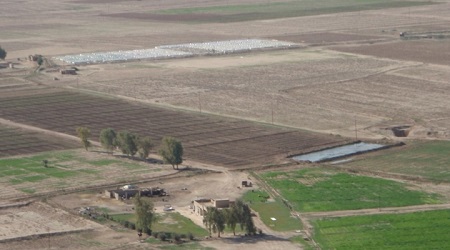Localizing Tenure Guidelines in Iraq

Within the framework of HIC-HLRN cooperation with members in raising and building their capacity, the Regional Reference Center for the Middle East and North Africa is preparing to hold a series of training sessions with its members of civil society in Iraq. The program will seek to localize global norms on equitable governance of land and other natural resources. Central to this initiative, in partnership with Together Association to Protect the Human and Environment, is localizing the Voluntary Guidelines on the Responsible Governance of Tenure of Land, Fisheries, and Forests in the Context of National Food Security as part of a method to assess land governance and recommend policy and legislative improvements in line with the Tenure Guidelines on the occasion of the tenth anniversary of their adoption by FAO in May 2012.
The interest in the Tenure Guidelines in Iraq comes in the context of what it suffers from in the current years, due to the drop in the water level in the Tigris and Euphrates Rivers, due to the construction of dams, in Turkey, Syria, and Iran, as well as climatic changes, Which requires taking the means and procedures to ensure the optimal and efficient use of water, and finding strategies that increase the efficiency of its use and its sustainability, because of its significant impact on the ecosystem, the amount of agricultural production, and then food, as well as the distribution of the population, in addition to the fact that the situation of resources Water in Iraq, raises the issue of obligations outside the territorial jurisdiction of the state, due to violations of neighboring countries in negatively affecting the enjoyment of Iraqi communities of its economic, social and cultural rights, especially access to natural resources and food production, and the fight against hunger in a sustainable manner.
In the context of these challenges, a workshop will be held with Iraqi civil society, which urges a better vision of the governance of tenure of land and natural resources. The workshop will focus on aspects related to policy documents and commitments related to land tenure and access, eradicating hunger, eradicating poverty and reducing inequality, highlighting the human rights approach to implementing those policy commitments.
Therefore, emphasis will be placed on clarifying the contrast between political commitments and international obligations, and defining the term the right to land as a basic need for human survival, and as an acquired human right. It also requires a discussion of the implementation of the Voluntary Guidelines, a study of tenure forms, their diversity, and knowledge of the privacy of Iraqi society in the forms of tenure that govern and regulate land administration, whether legal or customary/tribal, and the policies, institutions, and culture that influence the formulation of tenure forms at the national and local levels.
In the context of the prolonged crises that Iraqi societies are going through, as a result of war and conflicts, and the continued internal displacement of many local communities suffering from poverty, and their loss of property, homes and lands. The workshop will also deal with diagnosing the root causes of the protracted crisis situation, and striving to determine accountability for duty-bearers, whether inside the Iraqi state and various areas of its government departments, or outside it, in order to remind their responsibilities and obligations in reparation and compensation for victims, especially from marginalized communities and vulnerable groups. Among them are women, displaced persons, refugees, and small agricultural families who have lost their livelihoods and are increasing their impoverishment.
A questionnaire will be prepared on the extent to which the target groups in the workshop know the nature of the Voluntary Guidelines for the Governance of Land Tenure, and their legal value at the national and local levels. And knowledge of the gaps in Iraqi legislation and laws related to the definition and regulation of land tenure. As well as identifying gaps with regard to the issue of gender equality in the tenure of land, participation in its management, and the formulation of policies related to tenure.
Photo: Iraqi farmland lying fallow under bans against farming summer crops. The orders against sowing rice, corn, and other crops this summer came as a shock to the towns and villages in the once fertile plains south of Baghdad, where the local economy depends on farming. Nationwide, one in five Iraqis works in agriculture. Source: Flickr/Creative Commons.
|